Starting a new book is a little like the first few months of pregnancy. (Gentlemen, you’re going to have to find your own analogy; I’m sure there is one.)
You’re excited and a little nervous (less so of both if it’s not your first book or baby). Even though you understand the process, it still seems like a bit of a miracle that at the end of it you’ll have this whole brand new thing. And even though, especially at the beginning, nobody can tell you’re expecting — you think about your condition a lot, and find that it affects you on a daily, maybe even hourly basis.
So: no, I’m definitely not pregnant. But I am starting a new book.
The working title is Changing, and the for-now sub-title is Rewiring Ourselves and Our Organizations for Continuous Change. The core premise is that change is no longer a one-and-done thing, where you just pick the organization up, move it, set it back down again and leave it there. Change really is continuous — personally, socially, organizationally — and this is a huge challenge — because most of us are strongly wired to prefer stability.
The book, and our Proteus approach to change, reflects this reality: when working with clients to support them through major change, we help them to acquire mindsets, skills and ways of operating that will help them make this transition — and all the transitions yet to come. In other words, instead of just helping them make a change, we show them how to re-wire themselves and their organizations — per the subtitle — to be able to succeed and even thrive through the continuous change that is certainly ahead for them and for their companies.
I’m excited and nervous. It seems amazing that in a year or so, I’ll have a brand new bouncing baby book.
Since this is the fifth time I’ve done this, I’m pretty confident it will work out OK — but there are differences; I find that every book, as every pregnancy and every baby, is unique. This book is in some ways the most complex of any I’ve written: I need to communicate not only how change is different now — faster, more ubiquitous — and how and why that conflicts more deeply with our “stability wiring,” but also how our response to change now needs to be different. We need to think about and target our change efforts on three different levels — leaders, individuals and the organization itself — in order to be effective at dealing with rapid ever-present change and our wired-in resistance to it. Then there’s the fact that changing successfully (not just once but over and over) requires a shift in mindset, and also learning new behaviors and creating new systems and approaches. And finally, the fact that organizations today are much more complex, with the parts and people being much more interdependent, means that in making significant change, you have to think about all the implications of that change, decide which are the most critical and address those as part of the overall change.
Whew!
But I have faith in the soundness of our approach (I’m seeing it work for clients daily). And I also have faith in my particular super-power, which is to create order out of chaos; I’m good at cracking codes, in a way that allows others to benefit from the decoding. And, I’m getting tremendous support — both conceptually and practically — especially from my partner Laird McLean, who has broad and deep experience helping clients through all kinds of changes.
So, here we go…wish me luck.
And if you’re so inclined, I’d very much like to hear your experiences of going through organizational change: what happened, what worked, and what didn’t. I’m trying to gather as much real-world context as possible, to incorporate practical examples. Feel free to comment here or to email me at connect@proteus-international.com
Thanks in advance!

